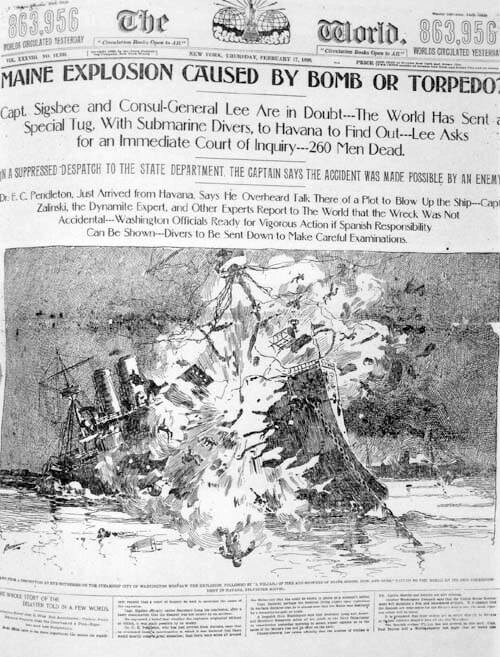Fake News and Modern Yellow Journalism
A century before the "fake news" brouhaha, clickbait web links, and the 24-hour TV news cycle, the scourge of yellow journalism plagued the newspaper industry. Its hallmarks included sensationalist headlines, exaggeration, a shortage of good sources, and an excess of scandal-mongering. Facts were spun to meet the agendas of the editors, and many articles were even outright fabrications. Major newspaper publishers competed in their pursuit of the lowest common denominator. Of course, this is relic of the past, long dead outside the wild and reckless frontier of the internet, right?

The Maine was likely destroyed due to an accident on board, although this remains disputed. Yellow journalism of the era sought to use this disaster as an excuse for war, and pushed the most sensational possible interpretation of the event. Image via Wikipedia.
Short answer: No. It just got more subtle.
Major media outlets have editorial agendas today, eagerly report the most lurid interpretations of partial information, and shamelessly repeat whatever the political mainstream desires. Objectivity and independent investigation are often illusory at best. Reporters often fail to probe deeply into serious issues because they fear losing access to politicians, law enforcement, and military contacts. The editorial staff decides what constitutes "news" for the publication or broadcast space available, and bias is inevitable. The modern 24-hour news cycle encourages the broadcast of partial information or outright falsehood in the pursuit of keeping "up-to-date on current events." Some outlets use painfully twisted logic to create sensationalist "news" out of nothing while ignoring opportunity for serious analysis of the topic at hand.
The internet is lampooned as a haven for "fake news," and it is true that there is no shortage of bias and fabrication. People with agendas and trolls looking for a laugh create a stew of bad media. Parody sites further muddy the waters for those with no eye for snark. However, the internet is also the biggest force for high-quality independent journalism ever known to humanity. Major news reporter Dan Rather was disgraced for outright lies presented as news only because the World Wide Web allowed independent scrutiny of the source documents he cited. Journalists like Glenn Greenwald are free to offer in-depth analysis of major news stories spun from partial information and a heavy dose of fearmongering sensationalism without being restrained by politics or corporate policy.
It is only through the efforts of independent journalism that we know about many atrocities committed by US government agents at home and abroad. Major media outlets are often reluctant to investigate allegations like Fast & Furious, the NSA data system, and Collateral Murder. The much-maligned partisanship factor in internet news is good for the public because it ensures someone is looking into the seedy underground of the power-brokers with extra scrutiny, and the risk of misinformation and selection bias is obvious to discerning readers so they can rationally consider the information presented.
There is no government solution to "fake news" that does not result in a Ministry of Truth and blatant propaganda. Free people need to be free to encounter and analyze a variety of news sources to gain a better understanding of the real situation. Bias cannot be eliminated, but it can be recognized and taken into consideration when news is presented. The risks of misinformation in an open environment are far less than the risk of misinformation from a central source. A free society requires a free press. A free people must be active in applying critical thinking to all matters. Freedom takes responsibility. I am willing to accept that responsibility. Are you?
nice post!!!
Thanks! This one took a fair bit of work to put together and edit.